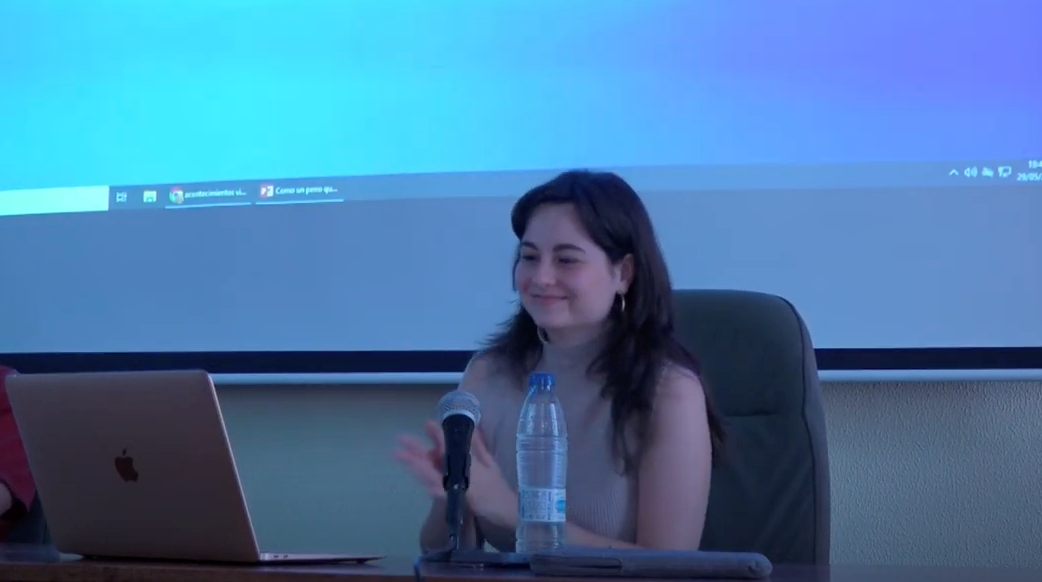The interview series poses questions concerning the role of affects and emotions in research practice and contemporary society to researchers on short-term visit and associate members of the Collaborative Research Center “Affective Societies.“ Today we introduce Milagros Pellicer Planells. She is working on a PhD at Departamento de Filosofía y Sociedad, Universidad Complutense de Madrid, Spain, where her research focuses on affectivity and New Materialisms in the arts, specifically on the affective agency of artworks and their social and political potential. In 2024, she was on a research stay for three months at CRC Affective Societies, where she co-organized a workshop on „Affective Excess.“

Which research question affects you at the moment? What is its social significance?
At the moment, I am researching the intertwining of New Materialisms and Affect(ive) Theories. By focusing on the body—on all bodies—we get to decenter human beings from the onto-epistemologies that shape our world and we get to think about non-human bodies as bodies with the capacity to affect and to be affected, and consequently, with social and political agency. Matters such as the ecological crisis we are currently facing are clear examples of such affective agency and demonstrate the need to address and recognize it.
Can you think of an emotion whose relevance has recently surprised you?
I would say if there is a surprising emotion, for me that would be disorientation. As Sara Ahmed elaborates in Queer Phenomenology (2006), “Moments of disorientation are vital. They are bodily experiences that throw the world up, or throw the body from its ground.” Thinking disorientation in these terms allows us to overcoming blockages that prevent us from entering in relations of composition with others. Although initially thought of as discouraging, disorientation can be home to a political potential for inhabiting those social, resistant lines that seem to deviate from the hegemonic regime of the sensible.
Do you perceive any affective driving force or affective barrier concerning your research work?
I believe desire is the affective driving force that inspire every research. We think of desire here from a Deleuzian point of view: not in terms of lack but in affirmative terms of creation, production, and movement. Desire allows for experience to take place, as it constitutes the basis of each encounter—encounters that open new paths that lead to new areas to discover. Desire, however, can also be dangerous: “Why,” asks Spinoza, “do men fight for their servitude?” Our current society encourages us to desire in a specific orientation that could be harmful, so researching affectivity from desire, as well as about desire, proves to be key to a collective coexistence.
Which book has lately affected you the most?
Laura Quintana’s Espacios afectivos (Barcelona: Herder 2023) has affected me in a very positive way. It is written in a dialogical format between Quintana and Damián Pachón, and it addresses some of the most urgent issues our society faces from an affective point of view, such as affective capitalism, violence, resentment, rage, or institutions. Furthermore, Luis Jaime Estrada Castro has recently published Acontecimientos de lo sensible (San Luis Potosí: El Diván Negro 2025), a book in which he proposes a politics of affects articulated in aesthetic, erotic, and poetic emancipation. This micropolitics is based on a collective feeling-thinking, while at the same time rethinking masculinity from a dissident perspective.
From which feelings or sentiments would you rather refrain at the moment?
I would refrain from the absence of feeling or what we could also name “hardness.” As Sara Ahmed writes in The Cultural Politics of Emotion: “Hardness is not the absence of emotion, but a different emotional orientation towards others.” This apparent hardness or absence of feeling, that can be seen, for example, in political discourses, should not be taken for that; it is rather a strategy to enforce a worldview that disregards other possibilities on the basis of a supposed overemotionality that would undermine political decisions. Politics are necessarily affective, so putting emotions at the centre of the discussion is a social and political need.
Edited by Matthias Lüthjohann and Annabella Backes






